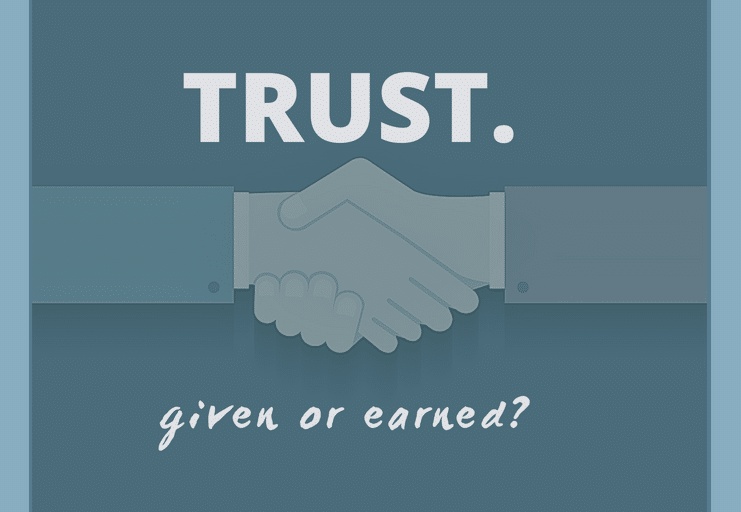Let’s Talk About Trust…
A little while ago, I had a great conversation with a group of people at an industry event. Most of us had never met and were accidentally seated at the same table. We came from a variety of different companies, represented different aspects of IT jobs, and were a nice representation of the different generations we currently find in the workplace. All in all, a nice and diverse group.
As part of the event, we did some group discussions at each table. Suddenly, our group found itself deeply engaged in a discussion about trust in the workplace and trusting people in general. It was fascinating.
It became clear that most people in our group believed in a model of a “Trust Bank.” This model entails that you earn trust credits over time until you eventually accumulate enough to be considered trustworthy. In this model, you can also lose trust credit points for certain acts and behaviors, and your “trust credit score” gets lower. After that, any kind of trust you need will be much harder to get, a.k.a. your “trust interest rates” are shooting up.
The longer I listened, the more I realized that I have a different take on this. Maybe I need to have a different approach than others, because my job in project and service delivery is so fundamentally linked to trust, with little time to make people earn it first.
I decided a long time ago, that in almost all situations where I meet a stranger, there is an equal chance that the new person is perfectly nice and trustworthy, as the chances are that they are not. Why would my default setting be to not trust this person, and make them earn it first? Why would I not extend trust and operate on a foundation of trust, until I have a reason not to?
Our projects these days are usually fast-paced, time-bound, and with the need to deliver results quickly. Our teams are often assembled solely for the project's purpose and have likely never worked together before. The teams are often disassembled soon after completion, and may not ever work together again after. There is simply a need to form fast-paced trust in project management.
If we apply the “trust bank” model, where you start with zero credit and earn it over time, we are not only slowing down the decision-making process on our project, we are also adding time to validate what the others were saying or recommending. We might start spending additional time reviewing and obtaining second opinions. This could lead to a culture of second-guessing or pocket vetoes, and we would likely have a lower commitment, less satisfaction, and flat-out less fun.
What if we all decide to just give everyone a decent credit score to start with? We choose to trust another person until they give us a reason not to. This way, I will listen to your recommendations, follow your lead, and we can move more quickly through our assignments.
Aside from the pace at which we pick up in a trusting team environment, we will also likely enjoy it more and have more fun.
As I explained my view on trust to the people at my table in our discussion, I had very mixed reactions. One former colleague in attendance said, “that is exactly what you do, I have seen you do that and even say out loud to strangers that you trust them.” She was right. I try to make it a point to use the word “trust” and tell people that I trust them.
Other people at the table were asking if I had never had a bad experience with it. Had my trust ever backfired, where I got blindsided or backstabbed? Of course, the answer is yes. I have had bad experiences with certain people, in certain situations. But honestly, those bad experiences are the exceptions. To me, those specific situations do not justify making everyone else earn my trust, when the vast majority of people I meet deserve my trust, appreciate being trusted and will go out of their way to justify the upfront credit.
I firmly believe that recognizing trust as a choice, and then executing on it will help our relationships and our joint endeavors. Whether it is on work projects, volunteering or personal spare time activities, giving upfront credit on trust can prove to be an effective tactic.
Trust me and give it a try!
Under the terms of this license, you are authorized to share and redistribute the content across various mediums, subject to adherence to the specified conditions: you must provide proper attribution to Stoneridge as the original creator in a manner that does not imply their endorsement of your use, the material is to be utilized solely for non-commercial purposes, and alterations, modifications, or derivative works based on the original material are strictly prohibited.
Responsibility rests with the licensee to ensure that their use of the material does not violate any other rights.






